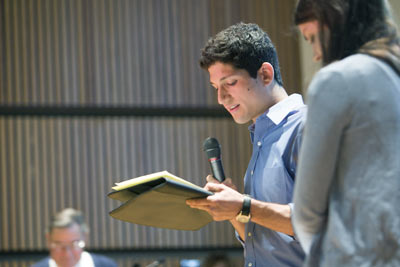Faculty Senate approves new academic calendar; Skorton and Fuchs will have final say
By Susan Kelley


The Faculty Senate gave the thumbs up to a new academic calendar May 9. The tally was 35 in favor, 25 opposed, with 3 abstentions.
However, the revised calendar is not a done deal. President David Skorton and Provost Kent Fuchs will now decide whether to accept it. If OK'd, the changes would likely be phased in over four years, said Kate Walsh, vice chair of the Academic Calendar Committee.
"I believe the resolution passed because faculty saw an opportunity to truly innovate how we educate in ways that could address student stress due to prolonged periods of instruction," said Walsh, the Fred G. Peelen Professor of Global Hospitality Strategy. The committee has been consulting with faculty, staff and students for two years to craft the proposal.
The senate also passed an amendment to review and modify the calendar on a regular basis. "So, if something proves to not work optimally, the university will address it," Walsh said.
The calendar passed despite the opposition of undergraduates who said the proposal to shorten study days by two-thirds of a day and reduce Senior Week (see details below) would be detrimental to student mental health. Speaking in opposition were Adam Gitlin '13, Student Assembly (SA) executive vice president, and Celia Muoser '13, incoming president of Cornell Minds Matter, a campus group that promotes student mental health. Also opposing those elements were more than 50 student leaders who signed a petition circulated to the Faculty Senate prior to the vote. The two undergraduate representatives on the calendar committee, SA Member-at-Large Geoffrey Block '14 and SA President Natalie Raps '12, also rejected the proposed changes.
The SA calls on Skorton and Fuchs to re-evaluate the senate's resolution and would like to work with the calendar committee to draft another proposal, according to a press release.
"We respect [the undergraduates'] passion and care for this important issue and appreciate their critical voice. If the calendar moves forward as proposed, we are certain student stress due to having an identical exam period and an optimal exam schedule will be minimized as much as possible," Walsh said.
Graduate and Professional Student Assembly (GPSA) President Evan Cortens said at the meeting the GPSA supports the changes.
The calendar is available online.
The calendar would:
- insert a daylong break near the midpoint of final exam schedules;
- reduce study days before final exams to four days from the current 4.66 days;
- retain the same number of exam days. In addition, Registrar Cassie Dembosky has said that a new method of creating the final exam schedule would reduce the chances that a student would have back-to-back finals or three exams in one day;
- reduce Senior Week programming by eliminating weekend and Monday programming; most seniors would not have exams on the last scheduled day of final exams;
- make the Wednesday before Thanksgiving a full day off;
- create a two-day break for students in February; and
- make Martin Luther King Jr. Day a university holiday.
Dean of the University Faculty William Fry convened the committee, composed of faculty, students, staff and administrators, in fall 2010. The committee's objectives were to re-examine the existing academic calendar with an eye to proposing changes that would: "comply with New York State Education Department requirements; afford optimal educational opportunities for both students and faculty; and address concerns about student stress and mental health related to prolonged periods of instruction without multi-day breaks (exclusive of weekends)."
Media Contact
Get Cornell news delivered right to your inbox.
Subscribe